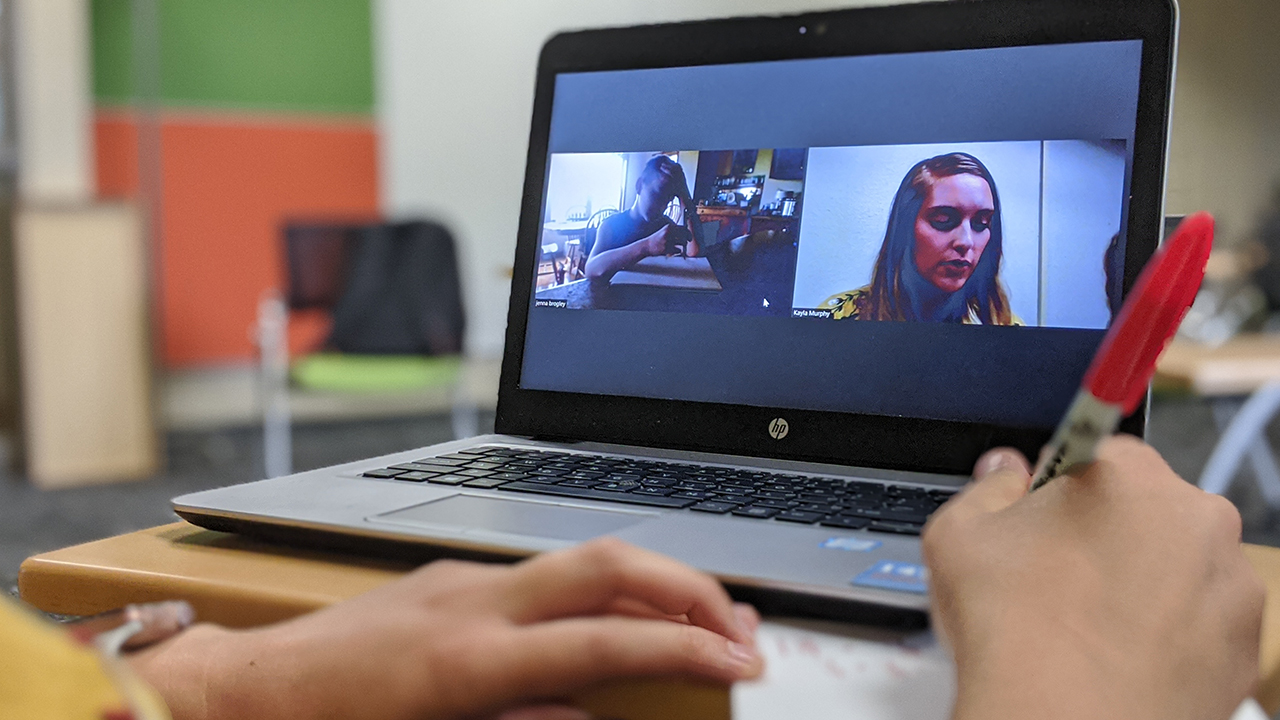
During the COVID-19 crisis, more than 70 University of Wisconsin-Platteville education majors took on the challenge of providing more than 100 homebound K-12 students in 11 school districts in Southwest Wisconsin with online tutoring support to ensure they continued gaining knowledge in a wide variety of subject areas.
Beginning in March, UW-Platteville students were paired with more than 60 elementary students, 20 middle school students and 20 high school students. Using Zoom, the future teachers read books on a variety of topics aloud to younger students and tutored older students in math, science and language. UW-Platteville students tutored students through mid-May, but some volunteered to continue tutoring until the younger students’ school year ends.
“When the COVID-19 pandemic shuttered the university, the School of Education had students who still needed to complete contact hours for a variety of courses,” said Dr. Jen Collins, director of the School of Education at UW-Platteville. “We also realized that, with the closing of K-12 schools, there were families who needed support in navigating online learning for their children. We took advantage of this unique opportunity and paired our future teachers with those students. Families were provided with free tutoring and our students were able to gain valuable experience teaching in an online environment. It was a win-win.”
UW-Platteville students said the learning experience was invaluable and provided them with an opportunity to connect with students and develop skills that will make them more marketable to future employers.
“In a time where we couldn’t physically be together, Zoom tutoring allowed us to fulfill what we are most passionate about – working with children,” said Maria Bast, a senior elementary/early-childhood education major at UW-Platteville from Platteville, who tutored four elementary students in reading and math. “We were fortunate to have been given this opportunity. Tutoring benefited the elementary students we worked with, but it also gave my classmates and me time to develop a new skill set, teach different subjects, work with different grade levels and meet new students. It was a great way to connect our university to the surrounding communities.”
“The tutoring program was a wonderful and valuable experience,” said Kaley Mumma, a junior agriculture education/horticulture major at UW-Platteville from Byron, Illinois, who tutored a ninth- and tenth-grade student in history and plant science. “I had great students who were patient with me as I adjusted to online tutoring. It was also a great opportunity to brush up on my early 1900s history.”
“The alternate delivery tutoring experience was exceptionally unique, providing reward and challenge,” said Ethan Wilkinson, a senior health education major at UW-Platteville from Baraboo, Wisconsin, who tutored a second-grade student in reading and language arts. “It was an experience that allowed me to learn about my abilities as an instructor and provided a unique learning opportunity for my student.”
Participating schools and parents also recognized and appreciated the positive impact the program had on their students and children.
“The tutoring program benefited our students, particularly those we were worried would fall behind,” said Dr. Jill Underly, superintendent of Pecatonica Area School District in Blanchardville, Wisconsin. “Their parents agreed and were excited to engage their children in this project. The students were motivated to do well in school but connecting with a UW-Platteville student teacher helped with their accountability. They didn't want to disappoint their tutor.”
“The outbreak of coronavirus completely changed our normal,” said Amy Kreul, mother of a seventh- and ninth-grade student at Platteville School District. “My husband and I have been working from home and our kids are finishing up the school year online, which has been a big adjustment for all of us. I am really grateful the UW-Platteville School of Education was resourceful in finding a way for their students to get experience as well as helping the community while schools are closed.”
Kreul said the tutors provided guidance on assignments, extra enrichment and something to look forward to during the week. “They were knowledgeable, reliable and extremely helpful,” she said. “The tutoring services have been a really great experience for our family.”
“My son looked forward to his tutoring meets every week and even asked for an extra day each week,” said Kathy Tydrich, mother of a sixth-grade student at Iowa Grant Elementary/Middle School in Livingston, Wisconsin. “With some parents still going to work every day, I was so happy to see this available so my son could have some help with his studies. Thank you, UW-Platteville. We would definitely sign up again for this opportunity.”
Collins recognized the importance of, and expressed gratitude for, the university’s partnerships with rural schools and communities.
“While many folks might assume that teacher training takes place solely on the UW-Platteville campus, the truth is that our rural schools and communities are vital partners in this endeavor,” she said. “They share their master teachers and amazing students with us and help bridge the gap between the curriculum education majors learn on campus and the real-time teaching that occurs in K-12 classrooms. We can never thank them enough. Being able to give back to those schools and families, even in this small way, has been gratifying.”
The UW-Platteville program has been so successful for all stakeholders that the School of Education hopes to continue the program, in some capacity, this fall, even if the COVID-19 quarantine ends.
“When challenges like the COVID-19 crisis arise, residents of rural communities turn to each other for support,” said Collins. “My hope is that the School of Education becomes one of the recourses that communities know they can turn to.”
To view an NBC15 feature about the collaborative tutoring program, visit: www.nbc15.com/content/news/UW-Platteville-students-help-kids-keep-learning-at-home-569646231.html